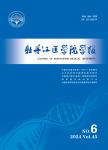A Clinical Study:Therapeutic Effects of Repetitive Transcranial Magnetic Stimulation and Cognitive Behavioral Therapy on Cognitive Impairment in Alcohol-Dependent Patients
A Clinical Study:Therapeutic Effects of Repetitive Transcranial Magnetic Stimulation and Cognitive Behavioral Therapy on Cognitive Impairment in Alcohol-Dependent Patients作者机构:Mudanjiang Medical UniversityMudanjiang 157011China Hongqi Hospital Affiliated to Mudanjiang Medical UniversityMudanjiang 157011China The First Affiliated Hospital of Jiamusi UniversityJiamusi 154007China Sun Yat-sen Memorial Hospital of Sun Yat-sen UniversityGuangzhou 510120China Collaborative Innovation Center of Development and Application of Northern Medical HerbsMudanjiang 157011China
出 版 物:《牡丹江医学院学报》 (Journal of Mudanjiang Medical University)
年 卷 期:2022年第43卷第4期
页 面:1-5,28页
学科分类:1002[医学-临床医学] 100205[医学-精神病与精神卫生学] 10[医学]
基 金:National Key Research and Development Program(2018YFC1314400) Key R&D plan of Heilongjiang Province(GA21C010)
主 题:Alcohol dependence cognitive function repetitive transcranial magnetic stimulation cognitive behavioral therapy
摘 要:Objective To observe the effects of repetitive transcranial magnetic stimulation(rTMS)and cognitive behavioral therapy(CBT)on cognitive function in alcohol-dependent *** Data from 285 alcohol-dependent patients were collected from Mudanjiang Medical University and Sun Yat-sen Memorial Hospital at Sun Yat-sen University between 2019 and *** patients were divided into groups depending on alcohol abstinence and *** were 43 patients in the alcohol consumption(AC)*** patients in the abstinence group were randomly assigned to treatment regimens with different combinations of rTMS and CBT using the Elton *** were 49 patients in the TB+C0 group,36 in the TB+C1 group,44 in the TL+C0 group,36 in the TL+C1 group,37 in the TR+C0 group,and 40 in the TR+C1 *** function was assessed by using the Montreal Cognitive Assessment Scale(MoCA).Results The proportion of patients with cognitive impairment in the AC group at 24 weeks was higher than that at baseline(P0.05),whereas the proportion of cognitive impairment in the other groups did not differ significantly over *** percentage of patients with cognitive impairment at 24 weeks was 52.3%in the TL+C0 group and 47.2%in the TL+C1 group,which was significantly lower than that in the AC group(P0.05).MoCA scores at different time points in the AC group were significantly higher than those in the TB+C0,TL+C0,TL+C1,TR+C0,and TR+C1 groups,*** scores were significantly higher at 12 weeks compared with the baseline in the TB+C0,TL+C0,TL+C1,TR+C0,and TR+C1 groups(P0.05),and similar changes were observed at 24 *** MoCA scores in the TL+C1 and TL+C0 groups were higher than those in the TR+C0 group at 12 weeks after the intervention(P0.05).Furthermore,MoCA scores in each of the TB+C1,TL+C1,TL+C0,TR+C1,and TR+C0 groups were higher than those in the AC group at 24 weeks(P0.05).Conclusion Alcohol consumption impairs cognitive function,as evidenced by a signifi



